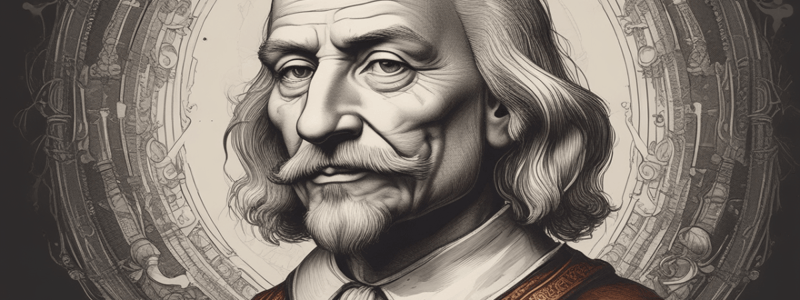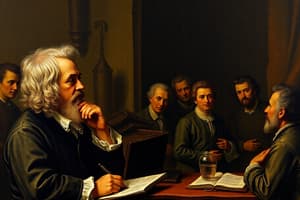Podcast
Questions and Answers
What is the term Thomas Hobbes used to describe a society without rules and laws?
What is the term Thomas Hobbes used to describe a society without rules and laws?
- State of nature (correct)
- State of anarchy
- State of liberty
- State of chaos
According to Hobbes, what would be the outcome of living in a state of nature?
According to Hobbes, what would be the outcome of living in a state of nature?
- Peace and harmony among citizens
- Progress and development of society
- Equality and justice for all
- Survival of the strongest and perishing of the weak (correct)
What is the social contract, according to Hobbes?
What is the social contract, according to Hobbes?
- A moral code that is followed by all citizens
- An unwritten agreement inherited at birth (correct)
- A social norm that is enforced by the government
- A written agreement between citizens and the government
What is the main difference between Hobbes' and Locke's views on human nature?
What is the main difference between Hobbes' and Locke's views on human nature?
What are the benefits of the social contract, according to Hobbes?
What are the benefits of the social contract, according to Hobbes?
What is a characteristic of a society in a state of nature, according to Hobbes?
What is a characteristic of a society in a state of nature, according to Hobbes?
What did Jean Jacques Rousseau believe was the duty of men?
What did Jean Jacques Rousseau believe was the duty of men?
Which philosopher believed that governments exist only to serve the needs of the people?
Which philosopher believed that governments exist only to serve the needs of the people?
What was the historical event during which Thomas Hobbes lived?
What was the historical event during which Thomas Hobbes lived?
What was the concept that Thomas Hobbes believed in?
What was the concept that Thomas Hobbes believed in?
What was the outcome of the English Civil War?
What was the outcome of the English Civil War?
What was the main concern of John Locke?
What was the main concern of John Locke?
What was the period of time during which Locke and Rousseau lived?
What was the period of time during which Locke and Rousseau lived?
What was the main difference between the views of Locke and Rousseau?
What was the main difference between the views of Locke and Rousseau?
What was the historical document that William and Mary had to sign to regain their throne?
What was the historical document that William and Mary had to sign to regain their throne?
What is the underlying philosophy of the United States Bill of Rights?
What is the underlying philosophy of the United States Bill of Rights?
Flashcards
State of Nature
State of Nature
A hypothetical situation where there are no rules or laws governing society.
Social Contract
Social Contract
An unspoken agreement between individuals and their government, where individuals give up some rights for protection and services.
Natural Rights
Natural Rights
Basic rights that individuals are born with, like life, liberty, and property.
Hobbes' View of Government
Hobbes' View of Government
Signup and view all the flashcards
Locke's View of Government
Locke's View of Government
Signup and view all the flashcards
Rousseau's View of Government
Rousseau's View of Government
Signup and view all the flashcards
Hobbes
Hobbes
Signup and view all the flashcards
Locke
Locke
Signup and view all the flashcards
Rousseau
Rousseau
Signup and view all the flashcards
English Civil War
English Civil War
Signup and view all the flashcards
Enlightenment
Enlightenment
Signup and view all the flashcards
General Will
General Will
Signup and view all the flashcards
Individual Rights
Individual Rights
Signup and view all the flashcards
Political Spectrum
Political Spectrum
Signup and view all the flashcards
Divine Right of Kings
Divine Right of Kings
Signup and view all the flashcards
Study Notes
Thomas Hobbes
- Proposed that a society without rules and laws would be a dreadful place to live, referring to it as a "state of nature"
- In a state of nature, people would act on their own accord, without responsibility to the community
- Life would be Darwinian, where the strongest survive and the weak perish
- A society without rules would lack comforts and necessities, including commerce, culture, knowledge, leisure, security, and arts
Social Contract
- The social contract is unwritten and inherited at birth
- It dictates that individuals will not break laws or certain moral codes, and in return, they receive security, survival, education, and other necessities
John Locke
- Viewed men as born into a "perfect state of nature" with natural rights and freedoms, including life, liberty, and the pursuit of happiness
- Believed men are born good and should be trusted to govern themselves through the creation of laws that protect them from unjust government actions
Jean Jacques Rousseau
- Believed that men are born free, but are shackled by oppressive governments
- Thought it is the duty of men to take control of the government and establish a government responsive to the "general will"
- His views are considered closest to the original idea of direct democracy, as practiced in ancient Greece
Evaluating the Views of Hobbes, Locke, and Rousseau
- Their philosophies can be placed along a political spectrum, involving a trade-off between natural liberties and freedoms versus strong authoritarian governments
- Hobbes saw the role of government as providing security and defense, with people owing everything to a strong leader
- Locke saw the role of government as protecting individual rights, with governments existing only to serve the people
- Rousseau's views emphasize the importance of political liberties and the need for a responsive government
Historical Context
- Hobbes lived during the English Civil War and believed in the Divine Right of kings
- Locke and Rousseau lived during the Enlightenment, a time of questioning authority and promoting reason and individual rights
- The Enlightenment led to economic and political prosperity, and the rise of property ownership by the common man
Studying That Suits You
Use AI to generate personalized quizzes and flashcards to suit your learning preferences.




